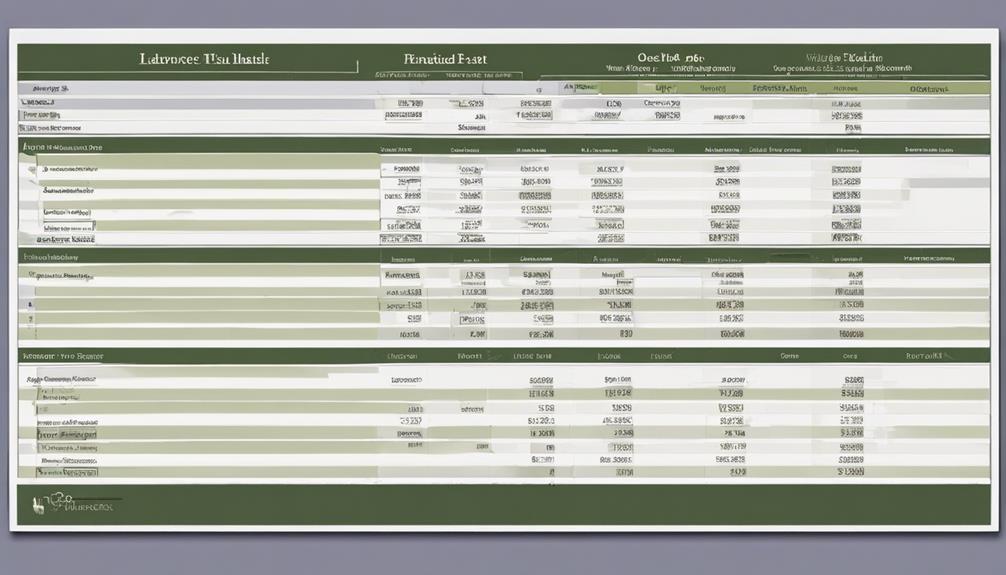In the complex process of divorce proceedings in California, the difference between complete financial transparency and hiding information can have a major impact on the final result. Disclosing all financial information is crucial for building trust and ensuring fairness in the distribution of assets and support agreements.
Through this lens, understanding the gravity of financial transparency becomes paramount. As we navigate the complexities of divorce, uncovering the nuances behind the importance of financial disclosure unveils a world where clarity reigns supreme, impacting every decision made within the process.
Key Takeaways
- Financial disclosure ensures fair property division and support determinations.
- Transparent declarations prevent disputes and legal issues.
- Full disclosure fosters trust and integrity in divorce proceedings.
- Compliance with disclosure obligations is essential for efficient resolutions.
Legal Implications of Incomplete Disclosures
Incomplete financial disclosures during a California divorce can have severe legal ramifications, potentially leading to sanctions and court-imposed consequences. The Declaration of Disclosure, a key form in divorce proceedings, requires parties to provide a comprehensive overview of their financial situation, including assets, debts, and income. Failure to disclose all material financial facts can result in significant legal sanctions.
Courts take a dim view of parties who attempt to conceal or misrepresent financial information, as this undermines the integrity of the divorce process. Parties have a legal obligation to be transparent and forthcoming in completing the Property Declaration and other financial disclosure forms. Non-disclosure of assets or income can result in agreements or judgments being set aside, causing delays, increased legal fees, and eroding trust between the parties.
Therefore, it's crucial for individuals going through a divorce in California to ensure they provide complete and accurate financial disclosures to avoid potential legal consequences.
Impact on Property and Support Division

Effective financial disclosure in a California divorce significantly influences the equitable division of property and determination of support obligations. By providing accurate and comprehensive financial declarations, spouses enable a fair assessment of their assets and debts, ensuring a just distribution of community property. Transparent financial disclosures play a crucial role in deciding spousal and child support amounts, as they form the basis for these determinations.
Full disclosure fosters transparency in the divorce process, facilitating the negotiation of agreements that reflect the true financial circumstances of both parties. Conversely, incomplete or misleading financial disclosures can lead to disputes and legal consequences, jeopardizing the integrity of the property division and support arrangements.
Therefore, ensuring thorough and honest financial disclosure is paramount to achieving a satisfactory resolution in terms of property and support division, ultimately promoting fairness and efficiency in divorce proceedings.
Ensuring Fairness and Transparency
To ensure fairness and transparency in a California divorce, thorough financial disclosure is imperative to reveal all relevant assets, debts, income, and expenses.
Transparency in financial matters is crucial for achieving equitable outcomes and fair division of property. By providing a comprehensive overview of assets and debts, both parties can negotiate from an informed standpoint, leading to a more balanced resolution.
Failure to disclose all financial information not only undermines transparency but can also result in legal penalties and unnecessary delays in the divorce process. Proper financial disclosure is essential for addressing the financial needs of each party and ensuring accountability throughout the proceedings.
Maintaining accurate records and documentation of all exchanged financial information is vital for establishing trust and promoting a sense of control over the divorce process.
Ultimately, full transparency in financial matters paves the way for a smoother divorce process and more satisfactory outcomes for both parties.
Consequences of Dishonest Financial Information

Dishonest financial information in a divorce proceeding can have severe legal repercussions and impact the equitable distribution of assets. Failure to provide accurate and complete financial disclosures may result in contempt of court for willful non-disclosure or providing false information. This dishonesty could lead to monetary sanctions being imposed, covering the other party's attorney fees due to the lack of transparency. Additionally, hidden assets or lies can lead to penalties, where the other spouse may be awarded assets as a form of compensation for non-disclosure.
Moreover, agreements made during the divorce proceedings may be set aside if undisclosed assets or false information come to light. Non-disclosure of financial information can cause delays in the proceedings, erode trust between the parties, and escalate legal fees due to the need to unravel the deceit. It's crucial to maintain honesty and transparency throughout the divorce process to avoid these negative consequences.
Importance in California Divorce Proceedings
In ensuring a fair and transparent resolution in California divorce proceedings, the significance of financial disclosure can't be overstated. Proper financial disclosure is a crucial element in the divorce process, laying the groundwork for informed decisions regarding property division and support arrangements.
Failing to provide complete financial details promptly can result in penalties, delays, and potential sanctions, underscoring the importance of timely and accurate information exchange. The ongoing duty to disclose financial information throughout the divorce process highlights the necessity of maintaining openness and transparency.
In California, legal requirements mandate full financial disclosure to facilitate equitable settlements and ensure that all parties have the necessary information to make fair decisions. By complying with these disclosure obligations, individuals not only fulfill a legal mandate but also contribute to a smoother and more efficient resolution of their divorce proceedings.
Frequently Asked Questions
What Is the Purpose of a Financial Statement in a Divorce?
In a divorce, a financial statement discloses assets, debts, income, and expenses. It aids in fairly dividing property and making support decisions. This transparency is crucial for informed legal choices, requiring timely and accurate disclosure.
Why Is Disclosure of Financial Statements Necessary?
We reveal financial statements to illuminate the shadowy corners of divorce proceedings. Transparency is our torch, guiding us through the murky waters of asset division. Without it, we stumble in the dark.
What Is the Purpose of a Financial Disclosure?
In a divorce, a financial disclosure serves to provide transparency and understanding of each other's financial standing. It aids in fair asset division, informed decisions on support, and prevents hidden assets.
Is California a Mandatory Disclosure State?
California requires full financial disclosure in divorce cases, preventing hidden assets and ensuring fairness. Failing to disclose leads to consequences. We must comply with these rules, keeping the process transparent for equitable outcomes.
How Do Financial Disclosure Forms Play a Role in California Divorce Proceedings?
In California divorce proceedings, the completion of the California divorce financial disclosure forms is a crucial step. These forms provide a comprehensive picture of each spouse’s financial situation, including assets, debts, income, and expenses. The information on these forms plays a critical role in the equitable division of marital property and in determining spousal support.
How Does Financial Disclosure Impact Divorce Proceedings in California?
In California, financial disclosure in divorce is crucial. Both parties must fully disclose their assets, debts, and income. Failure to do so can result in severe consequences. This disclosure impacts the division of property, child or spousal support, and overall fairness in the divorce proceedings.
Conclusion
In conclusion, financial disclosure in California divorce is absolutely crucial. Without it, you might as well be navigating a legal minefield blindfolded.
So, remember folks, honesty is the best policy when it comes to financial matters in divorce proceedings. Trust us, it's a lot easier to deal with the truth upfront than to face the consequences of deceit down the line.
Stay transparent, stay fair, and stay out of trouble.










